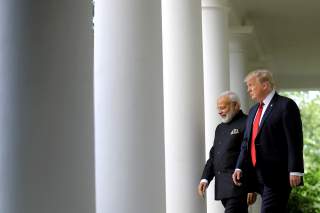The Case for a U.S.-India Partnership
A stronger India offers the prospect of a more stable balance of power in the Indo-Pacific, the world’s most economically dynamic region which stretches from the eastern shores of Africa to the west coast of the Americas.
Similarly, Alyssa Ayres points out the sad state of Indian language studies in the United States, with the number of college students enrolled in all Indian languages combined standing at less than a quarter of those studying Ancient Greek. The U.S. Department of Education can help reduce this shortfall by increasing resources for study and fellowships.
Other steps can be taken to enhance people-to-people exchanges. For example, a Young Indian Leaders Initiative could be modeled on the successful Young African Leaders Initiative, which brings nearly a thousand young people to the United States for several weeks each year and exposes them to American public policy institutions, building enduring ties between Africa and the United States.
The United States and India also can cooperate to tackle important social issues. For example, India’s Minister of Women and Child Development has supported a new smartphone panic button app that would give women who fear assault the ability to alert police and nearby cell-users. American companies can lend their expertise to help overcome technological hurdles.
Moreover, the Indian diaspora in the United States should be mobilized more effectively in support of the bilateral relationship. Numbering well over three million, Indian-Americans are, on average, young, well-educated and have high household incomes. This community of highly-accomplished professionals and entrepreneurs is now active in all walks of American civic life. One of the most encouraging trends is the growing number of Indian-Americans in both political parties holding public office and making significant contributions in federal, state and local government. The Indian diaspora enriches the American cultural fabric and it provides perhaps the strongest bond between our two countries.
Therefore, the Trump administration’s actions with respect to immigration are deeply troubling and ultimately self-defeating. The decision to review the H1-B visa program, which brings highly-skilled immigrants—many of them from India—to the United States in fields that suffer from personnel shortfalls, risks harming our economic and technological competitiveness. On any business day in New Delhi, one can find a long line at the U.S. embassy filled with people who aspire to visit, study, work, invest or live in America. It is hard not to be struck by their caliber, drive and spirit. These individuals should be welcomed to our country, not turned away or forced to jump over endless hurdles. If we close our door to them, someone else will benefit from our mistake.
THE U.S.-INDIA relationship is more likely to fall victim to sins of omission than sins of commission. Because so many government agencies have programs and policies that could impact the relationship, the administration needs to assign a top-level official to serve as the focal point for coordination to avoid missteps, one-off initiatives and the creation of bureaucratic silos. While the State Department is the obvious agency to lead the relationship, sustained high-level engagement is needed to successfully integrate the efforts of the State, Defense and Commerce Departments as well as other government agencies. The higher the level of engagement, the more that India will perceive American commitment as serious.
The national security advisor would seem to be the right person for the role, but in any administration she or he is too preoccupied with the urgent challenges of the day to become immersed in cultivating a deep and enduring partnership with India. That leaves the vice presidency as the natural office to take on an assignment of this magnitude. In the Obama administration, Vice President Biden played the role of convening stakeholders and riding herd for initiatives as diverse as the stimulus plan and the Cancer Moonshot initiative to apprenticeships and key foreign policy priorities.
Congress also must play a more active role. Large caucuses promoting ties with India in the Senate and House of Representatives can serve as platforms for catalyzing greater congressional engagement. Members of Congress should have a regular presence at high-level annual fora in India, just as they do at annual meetings such as the Munich Security Conference in Germany and the Shangri-La Dialogue in Singapore. If India is to be a global partner, then greater congressional involvement will be essential to forging a common view of global challenges.
Rhetoric about the value of U.S.-India ties abounds, but is not matched by actions to realize the full potential of the relationship. That can only happen with high-level attention and oversight by Congress and the White House.
In Washington, this will require us to do something inconsistent with our habits, and that is to sustain our focus on a country that is generally perceived as a benign actor. But if we make the investment now, we will realize an exceptional return in the form of a like-minded, capable and independent country that has growing strategic weight and will naturally be inclined to act in ways that are consistent with our own interests and values.
Chris Coons is a U.S. Senator representing the state of Delaware. Puneet Talwar was assistant secretary of state for political-military affairs, special assistant to President Barack Obama and senior director at the National Security Council, and an adviser to Vice President Joe Biden.

